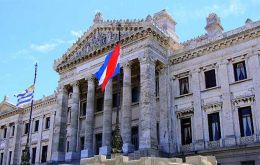MercoPress. South Atlantic News Agency
Tag: Andrés Ojeda
-
Monday, December 23rd 2024 - 23:05 UTC
Andrés Ojeda chosen to chair Uruguay's Colorado Party

Senator-elect Andrés Ojeda became the Uruguayan Colorado Party's new secretary-general in lieu of former two-time President Julio María Sanguinetti (1985-1990; 1995-2000), now aged 87. The 40-year-old Ojeda had jumped into the limelight when he ran for the presidency on Oct. 27 this year on behalf of the Colorado Party this year, clinching third place.
-
Sunday, October 27th 2024 - 21:55 UTC
Uruguay's 2024 Election: Voter turnout reaches 40% by midday, anticipating a close race

As Uruguayans head to the polls this October 27 to elect their president, vice-president, and Parliament, preliminary reports from the Electoral Court indicate a steady turnout. By midday, 40% of the 2,727,120 eligible voters had cast their ballots across the country's 7,276 polling circuits. Voting is mandatory in Uruguay, with those abstaining required to pay a fine or present a valid excuse, such as illness, disability, or international travel.
-
Thursday, October 24th 2024 - 11:05 UTC
What the polls say three days before the presidential elections in Uruguay

Uruguayans will head to the polls on October 27 to elect a successor to President Luis Lacalle Pou and renew the country's Parliament. According to the latest surveys, no candidate is expected to secure the required 50% of votes, setting the stage for a November runoff.
-
Monday, October 14th 2024 - 17:47 UTC
In a dull campaign and dull candidates, Uruguay votes new president and parliament on Sunday October 27

In less than two weeks time, Sunday 27 October, 2,8 million Uruguayan voters will be electing a new president, and a new parliament, 99 Lower House members and 30 Senators for the 2025/2030 period.
-
Monday, October 14th 2024 - 10:43 UTC
Swing voters to prove decisive in Uruguayan elections, poll finds

According to a Cifra survey released this weekend in Montevideo, Uruguay has 11% of swing voters who could end up pivotal in Oct. 27's presidential elections. Hence, political parties should focus on winning them over, the pollsters underlined. Cifra Director Mariana Pomiés underlined that this number could tip the scale at the end of the day.
-
Monday, October 14th 2024 - 09:07 UTC
Colorado candidate picks wrong analogy to describe Uruguay's relationship with Mercosur

Colorado Party presidential candidate Andrés Ojeda chose a controversial analogy this weekend to refer to Uruguay's situation within the South American Common Market (Mercosur). He claimed it was affecting his country's credibility not to kill any hostage when hijacking airplanes.
-
Monday, July 1st 2024 - 10:55 UTC
Uruguay's internal elections: Delgado, Orsi, and Ojeda to vie for Presidency

Uruguay's internal elections concluded yesterday, confirming Álvaro Delgado, Yamandú Orsi, and Andrés Ojeda as presidential candidates for their respective parties. The elections, held amidst a notably low turnout, saw some unexpected developments, particularly within the Frente Amplio (FA) and the Partido Nacional (PN).
-
Friday, June 28th 2024 - 10:56 UTC
Uruguay’s internal elections: Key players and possible outcomes

As the internal elections for Uruguay’s major political parties approach next Sunday, the consulting firm Opción Consultores has released a public opinion report evaluating the potential impact of voter turnout on the outcomes for the Frente Amplio (FA), Partido Nacional (PN), and Partido Colorado (PC). The report, released this Thursday, provides a detailed analysis of how varying levels of voter participation could influence the percentage of votes each pre-candidate might receive.
